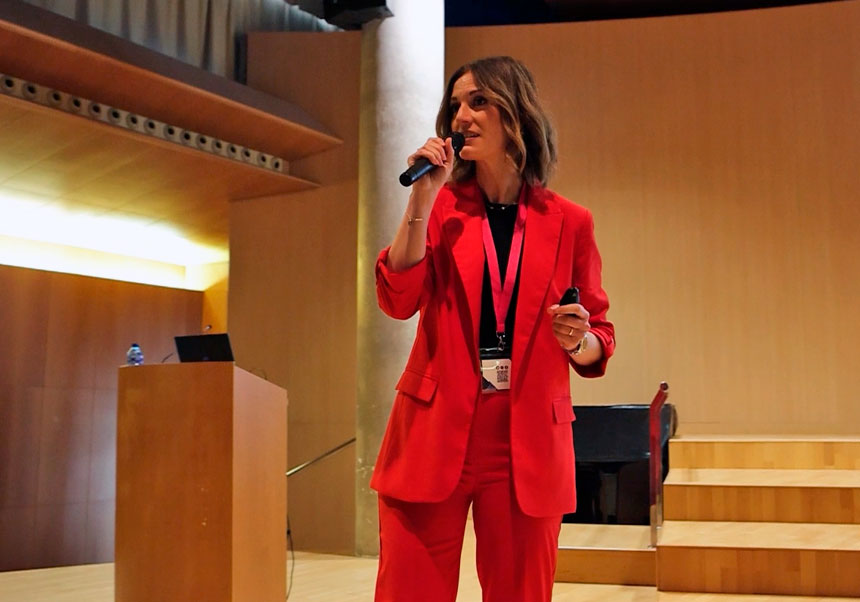Users
Social media
- More details here...
- Address
Parc Científic de la Universitat de València C/
Catedrático Agustín Escardino, 9
46980 Paterna (Valencia) Spain - Email:
iu.i2sysbio@uv.es - Phone:
(+34) 963544810
- Address
Links
Interview with Pilar Domingo-Calap: Phagotherapy to stop the silent pandemic of multidrug-resistant bacteria

Investigation
Seminar
Interview with Pilar Domingo-Calap: Phagotherapy to stop the silent pandemic of multidrug-resistant bacteria
During the 2nd Virology Congress held at the Burjassot Campus of the UV, the renowned researcher Pilar Domingo-Calap highlighted the growing threat of multi-resistant bacteria. In addition, he presented the advances achieved through innovative therapies based on phages, offering a hopeful vision for the future of medicine.
Q- Could you explain what multidrug-resistant bacteria are and why they represent a significant challenge for public health and modern medicine?
A- They are bacteria that today have acquired the ability to live in the presence of antibiotics. Therefore, if before we were able to treat a bacterial infection with amoxicillin, now we can no longer, because the bacteria have now become multi-resistant. It is a global problem that causes more than a million deaths a year. To give us an idea, here in Spain traffic accidents cause about 1,000 deaths a year and with the problem of multi-resistant bacteria we have between 10,000 and 15,000 deaths annually in our country, therefore, we are facing a real problem that requires short-term solutions.
P- As director of the Environmental and Biomedical Virology group at I2SysBio, could you briefly explain the latest projects? research in which the group is immersed?
A- Faced with this situation, which is now known as the silent pandemic, from our research group what we are trying to do is develop and implement new control strategies based on bacteria viruses, on phages. It is known that viruses in general are bad, they cause infections, but what we do is use that ability to kill cells to use them as biocontrol, biotechnological or biomedicine tools.
Our idea is to go to the environment, because these viruses, these phages, are the most abundant biological entities on the planet, so we are going to look for them in the environment to kill a target bacteria very effectively and in a very precise and personalized way. We do this from a One Health global health approach, according to which we are going to combat bacteria that cause infections in humans, animals, plants and even the ecosystem. Our idea is to develop and implement these strategies that are very innovative to provide treatments for patients who have no solution, but also as diagnostic and prevention tools.

Q- You are co-founder and scientific director of Evolving Therapeutics, a spin-off of the University of Valencia that develops biotechnological solutions for the prevention, diagnosis and treatment of resistant pathogenic bacteria, with a phage-based methodology. Could you explain to us what phage therapy consists of and how it could revolutionize the treatment of phage-resistant bacterial infections? antibiotics, especially in the context of national health?
A- Phage therapy consists of the use of these phages, these environmental viruses, to kill very precisely, without side effects, a bacteria that currently has no treatment. Phage therapy in Europe is not regulated yet, but in Spain it is possible to use them as a compassionate treatment, that is, as a last resort treatment in patients who have a chronic infection caused by a bacteria that has no treatment. life.
We also do this in veterinary medicine or in agricultural fields. At the company we have also been pioneers in using phages as a biocontrol treatment in vines, in a vineyard in the Balearic Islands against the bacteria them with very promising results. We are talking about people who, in our case, almost always have cystic fibrosis, which is a genetic disease that causes them to have - broadly speaking - lung problems associated with mucus that causes bacteria to be acquired, grow and colonize, in many cases multi-resistant bacteria, without treatment. We perform simple treatments with nebulized phages so that they reach the lung in about 10 days and we have seen that patients are able, in a few days after treatment, to recover their quality of life a little, improve expectoration, lose mucus and also improve their lung capacity. Therefore, we are improving their lives thanks to phage therapy.
P- As a professor of the master in Virology of the University of Valencia, and specifically coordinator of the Scientific Conferences subject, could you share your opinion on the relevance of this congress for the training of the student body of the master?
A- The interesting thing here is that in Valencia we are a very strong center of virology, for two years we have had the master's degree in Virology and, this specific subject "Scientific Conferences and Seminars" has two blocks: In the first block we bring an expert guest and the students have to generate a short presentation based on what the speaker will be able to talk about. And the second part is the creation of the Congress, they have to organize the Congress from within, have its President, Vice President, a scientific commission... and, therefore, I think it is a very important part that gives the students other types of improvements.


